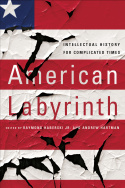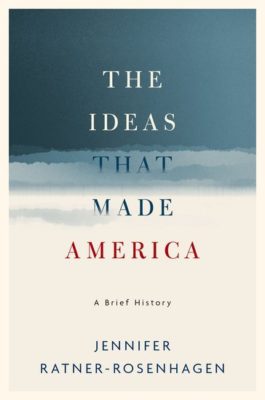 For a number of reasons, this past year has presented several challenges to my identity as an intellectual historian.
For a number of reasons, this past year has presented several challenges to my identity as an intellectual historian.
Nothing has hampered, however, my fundamental sense of myself as a historian. The personal and professional problems of the year, in fact, required the imprint of my training—the sense of historical thinking imbued in my person. I could not have navigated the unexpected death of my mother and the murder of two professional dreams (a book project and a job) without the intellectual sensibilities provided by years of historical study. It’s easier to survive traumas when you understand the larger structural problems in medicine, religion, higher education, and capitalism that enabled their effects in your life. It’s not personal, but rather just the “business” of a flawed world, or at least the peculiarities of circumstance. Historical knowledge enables a certain deep-seated stoicism, or psychic grit.
Despite giving me the intellectual and personal tools to survive, the structure of my circumstances disabled the needed time and peace, at a desk, that help one do intellectual history. By this I mean that my time for broad reading, for spot reading numerous texts, for careful note taking, drafting, redrafting, and finalizing a text—all of it—has been severely curtailed. I’ve been able to read works of intellectual history, and ponder their quality and significance. But I have not been able to refine my thinking at a desk, with either a pen or keyboard on hand.
These circumstances left me in a wilderness of depression and confusion. It was not a clinical depression, but rather one of grey clouds everywhere, confusing my sense of purpose–my sense of future direction. Even when I could engage for specific dialogues or tasks, a paper here or some comment-section contributions there, the overall sense purpose wasn’t there. This state of being lasted all through 2018.
In the past few months, however, I’ve began to feel my way toward the passions that sustained a long run of work, here with the blog and Society, and elsewhere. That renewal began, ironically, with the death of Leo Ribuffo—and courtesy of virtual engagement with two colleagues I know quite well, Andrew Hartman and Ray Haberski.
Ribuffo’s death occasioned a long segment on Hartman’s and Haberski’s two-man podcast show, Trotsky and the Wild Orchids. I don’t listen to their show consistently. I just counted and I’ve fully absorbed only about one-third of their 25 total podcasts. The first one that I starred for re-listen, however, was their show on Ribuffo. I really appreciated their recounting of Leo’s work–exploring a catalog that I realized I didn’t know as well as I should. But it was their discussion of Leo’s personal biography and personality, of his sincere cantankerousness and his dedication to his colleagues and friends, that sparked some embers that had been doused by the bitter waters of 2018.
 Then, more recently, I listened to their interview with Jennifer Ratner-Rosenhagen. Jennifer’s recounting of her time at Rochester, and her inspiration to write The Ideas that Made America, touched a deep vein of desire for our shared work. I’ve long appreciated Jennifer’s enthusiasm for the field, and her writing style and deep engagement with the field. I think her evident appreciation for the deep questions that have animated U.S. intellectuals rekindled my own desires to ponder the discourses that have fed America’s sense of itself, and its problems. It was a great program, and I’ll listen to it again in the near future.
Then, more recently, I listened to their interview with Jennifer Ratner-Rosenhagen. Jennifer’s recounting of her time at Rochester, and her inspiration to write The Ideas that Made America, touched a deep vein of desire for our shared work. I’ve long appreciated Jennifer’s enthusiasm for the field, and her writing style and deep engagement with the field. I think her evident appreciation for the deep questions that have animated U.S. intellectuals rekindled my own desires to ponder the discourses that have fed America’s sense of itself, and its problems. It was a great program, and I’ll listen to it again in the near future.
If the enthusiasm I’ve drawn from those programs constituted a fleeting fall for some kind of mere performance, then the American Labyrinth volume—also a product of my two friends’ editorial stewardship—has provided some ballast to the winds of emotion. The three-month space between the Ribuffo and Ratner-Rosenhagen programs (December 2018 and March 2019, respectively) overlapped, in the past four weeks, with a slow reading of American Labyrinth. I have been posting brief updates about each of the essays in the S-USIH Facebook group. As of today, I’ve read 14 of the 18 pieces. (I won’t read one of the last four because, well, I wrote it.)
Even though I attended the conference two years ago that fed the contents of the book, I only read draft versions of the essays. I know that several of those, like mine, experienced extensive editorial review. All came out much different on the other side. I disliked early versions of a couple, but now have found all readable and enjoyable in the book.
The sum total of the fourteen I’ve read have renewed and reinvigorated my personal sense of the value of our shared endeavor. They–along with the two above-mentioned podcasts—have inspired me to actively adjust my circumstances. I think I can cobble together the time, energy, and space for reading, spot checking, drafting, and writing. In sum, I believe I can, with some adjusting and dedication, meet the demands of scholarly work required to do quality intellectual history. I can, in sum, do more with the historical training that is important to my identity. It’s been a labyrinthine process to find this place of renewal. But I think it’s here again.
In my next installment I’ll outline what I’ve gleaned from the book in terms of having a better sense of what I want to do in the field—meaning the approaches and wisdom on display in American Labyrinth that might also help you see why the field matters now more than ever.

2 Thoughts on this Post
S-USIH Comment Policy
We ask that those who participate in the discussions generated in the Comments section do so with the same decorum as they would in any other academic setting or context. Since the USIH bloggers write under our real names, we would prefer that our commenters also identify themselves by their real name. As our primary goal is to stimulate and engage in fruitful and productive discussion, ad hominem attacks (personal or professional), unnecessary insults, and/or mean-spiritedness have no place in the USIH Blog’s Comments section. Therefore, we reserve the right to remove any comments that contain any of the above and/or are not intended to further the discussion of the topic of the post. We welcome suggestions for corrections to any of our posts. As the official blog of the Society of US Intellectual History, we hope to foster a diverse community of scholars and readers who engage with one another in discussions of US intellectual history, broadly understood.
First, Professor Lacy, you have my condolences over the death of your mother. Secondly, your piece really spoke to me. All too often I have seen people caught within the web of a horrifying job market lash out at others or let the darkness consume their better nature. So I applaud your strength of character as you spin gold out of a crappy situation. (I envy your stoicism by not taking professional setbacks personally. Even though I am well aware of outside factors that influence our successes or failures, years of schooling and our culture make it hard for one not to take our setbacks as a personal failure.)
Our colleagues don’t make it any easier. Academic hierarchy makes solidarity impossibly hard. Some of the most haunting pieces I have ever read at this site were penned by Professor Burnett concerning the “job market.” It wasn’t the content of her pieces; they were typically well written. It was the comments that the various pieces provoked. The most angry I had ever gotten by something I had read was her recap of the 2012 OAH meeting in Chicago. (Has it been so long already?) The highly educated readers here parroted the “meritocratic blame the victim” trope to explain academic unemployment. A few years later, she produced another piece with (completely justified profanity!) Even a readership as woke AF as this one has its blind spots.
I look forward to your future works, and, as always I wish you nothing but the best in your future endeavors. The best work has its own rewards.
Brian: Thanks for this comment. (And thanks for all of your comments here, on my posts and others!)
Truth be told, the academic job market wasn’t on my mind when I wrote this. I enjoy my work in Student Affairs, even while I teach a bit on the side. I was thinking, in the main, about how I occupy my “hobby” time in the field—what motivates me toward particular lines of inquiry. And I had been sad that my motivation for self-identified *intellectual* history had been lacking, even while I never consider my work and questions outside the range and scope of ideas. I do consider ideas *foundational* to my desires. But I had been having trouble expressing why that is so. Next week’s post will dive further into that.
Despite appearances above, I do take job changes and losses personally. Oh my do I. But my mindset as a historian helps me cope. We underestimate, generally, the ability to history to feed our mechanisms for coping. Solid historical thinking is most certainly therapeutic. I expressed the stoical aspect above, by keeping in mind that we’re enmeshed in structures beyond our control. But history helps us be generative and creative as well. Knowledge of history and recourse to historical thinking help me do more than just “take it.” History enables one to take more control, or to see where control might be possible.
I too admire Lora Burnett’s reflections on the job market (and the canon and close reading and on and on). Her writing, and pieces by others here, have helped expose the theater of meritocracy we accept in the academy—the pretense that quality and connections or other capricious factors rule the way the academy doles our tenure lines. – TL